Central Group, one of the largest residential developers in the Czech Republic, has invested over CZK 6 billion in land across Prague in the past year.
These record-setting acquisitions include strategic sites in Prague 3, 8, 9, and 18, with plans to build up to 3,500 new apartments in the coming years.
The company confirmed that this is its biggest series of land purchases in 30 years, marking a bold push to meet rising housing demand in the capital.
Among the most high-profile deals is a parcel adjacent to the Olympik Hotel, between the Libeň Bridge and Invalidovna metro station in Prague 8. The area, currently housing obsolete warehouses, is expected to undergo full transformation into a modern residential district.
This location has long been considered a prime target for redevelopment due to its excellent public transport access and proximity to the city center. Central Group has already initiated discussions with city authorities regarding zoning and project approvals.
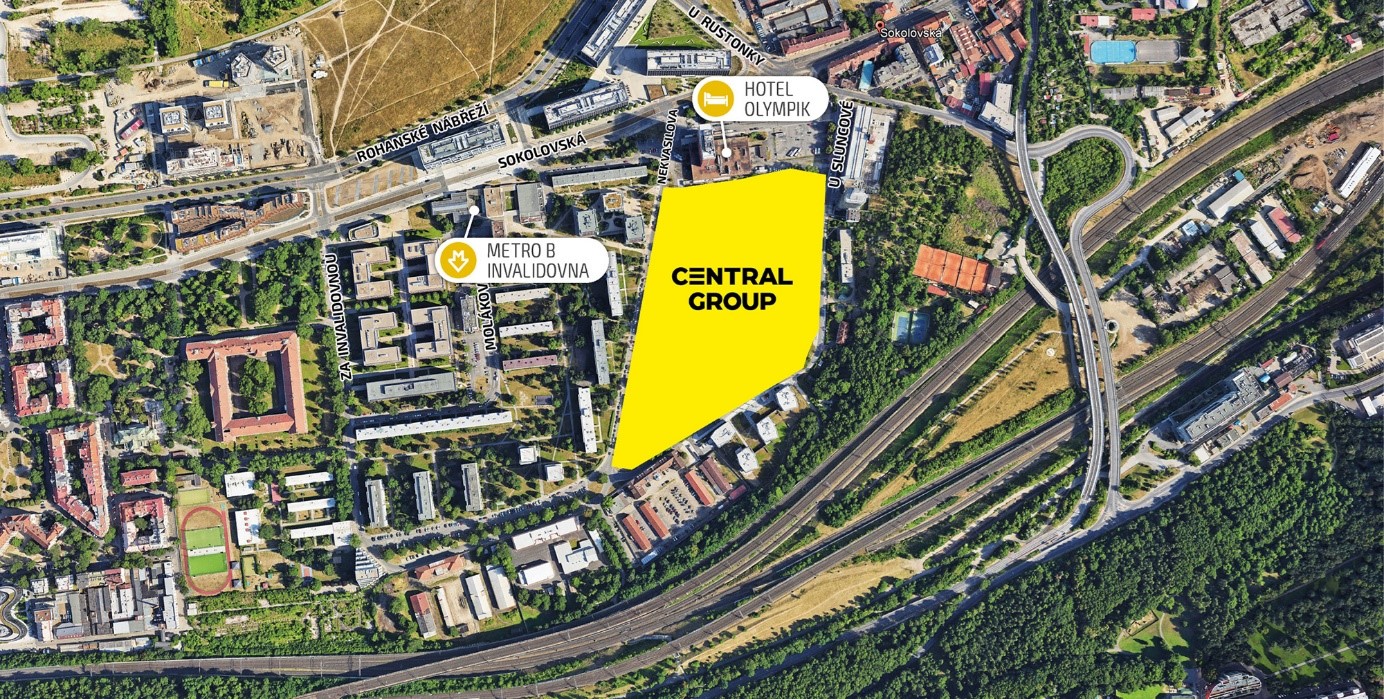
Central Group also finalized deals in several other Prague districts:
- Prague 3 (Jarov): Land purchased for future apartment blocks.
- Prague 9 (Vysočany): Sites with existing industrial buildings slated for demolition and residential transformation.
- Letňany and Zličín: Large development-ready areas located near metro stations and planned civic amenities.
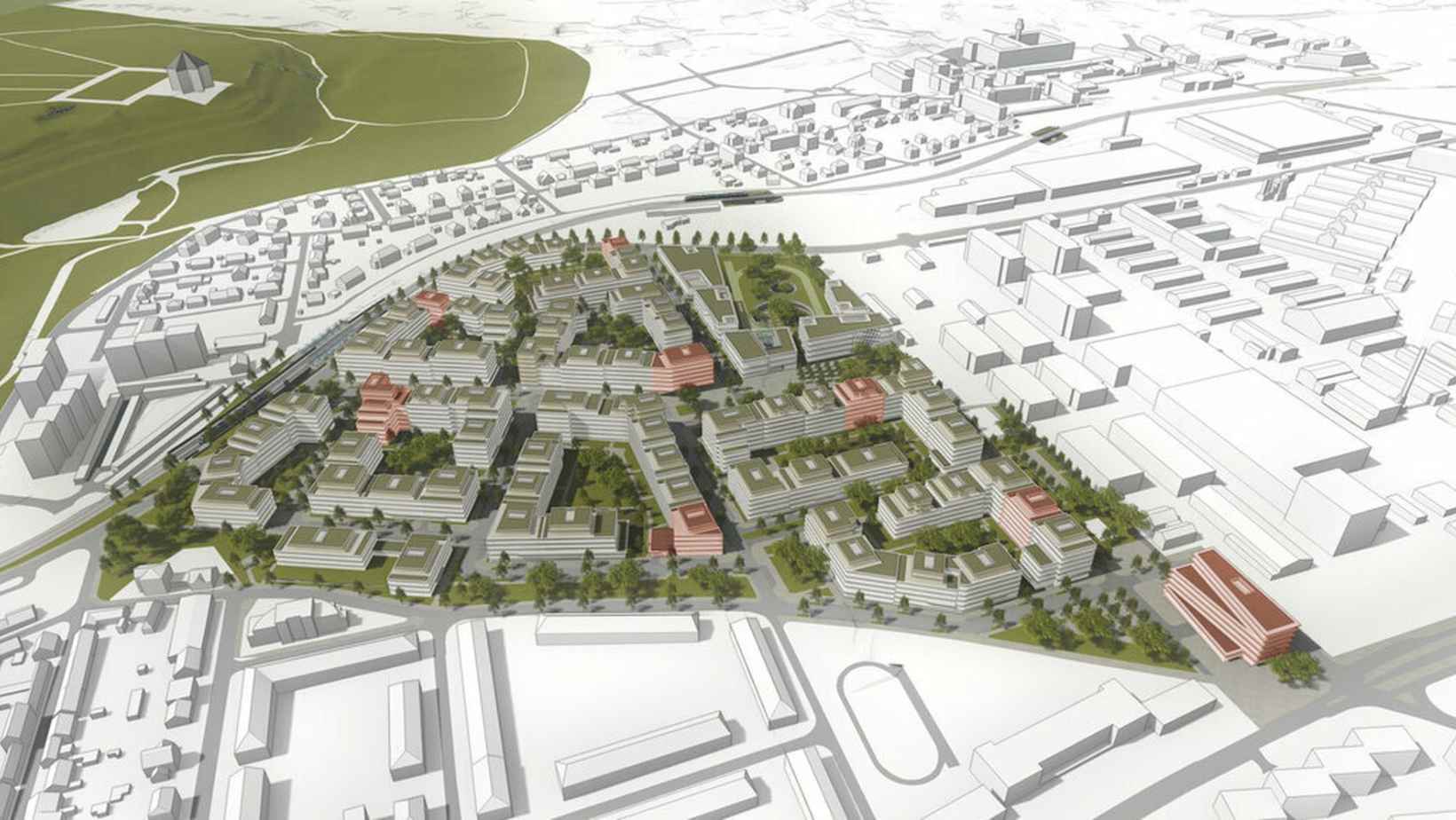
Many of the newly acquired plots are either already included in the Metropolitan Plan, or the developer will seek zoning adjustments to enable residential construction.
Central Group emphasized its commitment to creating accessible, high-quality housing for a broad spectrum of residents, including families, young professionals, and seniors.
The total area of the newly acquired plots equals more than 30 football fields—a scale that gives the company a unique advantage in long-term planning and phased construction.
Would you like us to write about your business? Find out more
In Prague, drivers spend an average of 57 hours a year in rush hour traffic. Smaller Czech cities are also increasingly plagued by traffic jams.
Drivers in Brno or Ostrava do not escape similar problems. However, other Czech cities are also increasingly plagued by traffic jams – for example, drivers spend an average of 35 hours a year in České Budějovice and one hour less in Pardubice.
Along with the increase in the number and likelihood of traffic collapses, the average emissions released into the air during journeys are also increasing. In Prague, for example, each petrol car emits an average of 842 kg of CO2 in the time it spends in traffic each year.
According to a recent Dutch company TomTom research, 84 trees would have to grow annually to absorb this amount of carbon dioxide for every single car stuck in a traffic jam.
Prague is testing advanced video analysis of traffic flow
Prague will test a new method of obtaining anonymized statistical data about traffic, the city website informs. In particular, municipal company Operátor ICT will be making advanced video analysis, with the objective of improving the management of the traffic flow and making it more efficient.
The purpose is for the capital city to have backing for future decisions about territorial development, changes in traffic signs, or modification of signal plans, or construction modifications.
In total, several traffic parameters will be investigated, using one technology tool. This involves the flow of passenger cars and trucks, buses or single-track vehicles, traffic intensity, models of means of transport, speed, driving directions, traffic jams, and dangerous situations.
Urban districts typically deal with traffic issues such as overcrowding of detours, dangerous crossings, crowded intersections, traffic jams, violations of truck entry bans or turning bans.
With this in mind, 10 key locations were selected for the test, including a roundabout, a road with and without a pedestrian crossing, roads with different construction layout of intersections and trajectory of vehicles.
Would you like us to write about your business? Find out more
Looking for a summer escape filled with colour, scent, and calm?
Across Czechia, lavender farms and herb gardens are opening their gates to visitors, offering a different kind of seasonal experience—one scented with fresh blooms, homemade products, and peaceful countryside views.
You don’t need to go to Provence to be surrounded by lavender. Several farms in the Czech Republic now cultivate the purple flower, known for its calming properties and strong fragrance. During peak bloom, the fields are not only a sight to see but a sensory experience—especially when paired with lavender-flavoured treats.
One of the best-known stops is Lavender Valley in Chodouň, near Beroun. Here, visitors can explore the fields, try wellness treatments using lavender oils, and enjoy refreshments like lavender lemonade and ice cream. Nearby, you can also visit the Křivoklát Castle or take a tour of the Rückl glass factory, both easy detours from the farm.
Further south, in South Moravia’s wine region, the Lavandia Farm near Starovičky opens for the season with its own café and lavender products. The farm sits near the Lednice-Valtice landscape area, making it a scenic addition to any trip to the region.
In Central Moravia, Bezděkov Lavender Farm offers something more relaxed—a short walking trail through its lavender beds and even massages on-site, available by reservation.
Historic Gardens and Herbal Delights
If you’re more interested in herbs beyond lavender, there are gardens across the country combining history, education, and hands-on experiences.
In East Bohemia, the Baroque Hospital Kuks features a reconstructed herbal garden, open from sunrise to sunset. Originally designed for medicinal use, it now offers a peaceful place to stroll among medicinal plants and learn about their history.
Down in South Moravia, the Lu & Tiree Chmelar Herb Garden is located within the grounds of Valtice Chateau, part of a UNESCO-listed site. The garden includes a shop selling teas, oils, and dried herbs grown on site.
Meanwhile, at the Botanicus Gardens in Ostrá (Central Bohemia), visitors can see how herbs are turned into jams, teas, and natural cosmetics. There’s also a workshop area where you can try your hand at making herbal soap.
Where Joy Grows—Literally
A unique destination for herb lovers is Čejkovice, also in South Moravia. It’s home to Sonnentor, a company that has been producing organic teas and spice blends for decades.
Their visitor centre offers guided tours through the entire process—from harvesting to drying to packaging—explaining how their products are made. Locals like to say, only half-jokingly, that “this is where joy grows.”
Would you like us to write about your business? Find out more
Prague Music Festival (‘Praha Žije Hudbou’) will take place between the 6th and 7th of June.
200 musicians will take part in the ninth year of the street art festival, playing in the streets, squares, and parks of Prague.
Praha Žije Hudbou is a multigenre street art festival whose aim is to present street art to the public and support the idea of busking.
This multi-genre festival aims to showcase street art and promote the culture of busking — spontaneous artistic performances in public spaces.
Over 120 acts, including well-known names such as Annet X, Anki, singer-accordionist Rozálie, David Kraus & Gipsy Brothers, and singer-songwriter Kvietah, will perform across more than 20 locations throughout the city.
The festival promotes a simple motto: Art belongs in the streets. With performances ranging from live music to theatre, dance, and magic, Praha Žije Hudbou offers a one-of-a-kind cultural experience accessible to all.
What is busking?
Busking refers to any form of street performance, not just music. Performers may sing, dance, act, or even perform magic in public spaces. Traditionally, audiences show their appreciation by dropping a voluntary contribution into the performer’s hat.
All events in the festival are free of charge, but artists rely on and welcome public support. If you enjoy the performance, don’t hesitate to show your appreciation.
Would you like us to write about your business? Find out more
A major Bitcoin scandal has erupted in the Czech Republic, unsettling the government just a few months before national elections.
The controversy is about a convicted criminal’s donation of more than $45 million in Bitcoin to the Ministry of Justice. This caused widespread anger, led to the resignation of Justice Minister Pavel Blažek, and prompted opposition parties to call for a no-confidence vote.
The main issue is that Tomáš Jiříkovský sent the Czech Ministry of Justice 468 Bitcoins, which are valued at roughly $45 million. Jiříkovský is a convicted cybercriminal who was sent to prison in 2017 for hosting the “Sheep Marketplace,” a dark website where users could buy and sell illegal stuff like drugs and guns. The cops took his things when they arrested him, and he had a lot of Bitcoin.
Jiříkovský publicly donated some of the Bitcoin that had been confiscated from him back to the police after he was released in 2021. People said that the move was supposed to demonstrate that they were sorry. Critics, on the other hand, argue that it was an organized operation to disguise money laundering beneath a show of kindness.
Minister’s Resignation Amid Backlash
Justice Minister Pavel Blažek took the donation at first, but he didn’t look into where it came from. Since then, both the public and his political opponents have been very critical of his choice. Later, Blažek defended what he did by saying that he didn’t think taking the donation would cause any legal problems because he thought it was given in good faith.
However, the optics of a government agency getting a huge cryptocurrency gift from a known criminal were too bad. Blažek quit his job on May 30, to protect the administration’s reputation.
The resignation has only made people pay more attention to the current government. There are also new claims that high officials, such as Prime Minister Petr Fiala and Finance Minister Zbyněk Stanjura, knew about the donation ahead of time but didn’t do anything about it.
Opposition Pushes For No-Confidence Vote
The opposition, led by former Prime Minister Andrej Babiš’s ANO party, has taken advantage of the issue. Karel Havlíček, the vice-chair of ANO, said in public that the party is getting ready to ask for a vote of no confidence. He said, “We will call for a no-confidence vote unless something really strange happens.” There is no other choice.
Opposition leaders say that the scandal hurts the confidence of the court system and shows that the ruling coalition is bad at making decisions and running the country. They say that taking such a gift demonstrates a complete lack of respect for ethical and open principles.
Investigations Underway
Officials are currently looking into the details of the donation. The High Prosecutor’s Office in Olomouc is looking into possible abuses of power and money laundering. The police’s organized crime branch is also looking into whether any crimes were committed while the donation was being accepted and processed.
Would you like us to write about your business? Find out more
The EU unemployment rate was 5.9 per cent in April 2025, stable compared with March 2025 and down from six per cent in April 2024, Eurostat said.
The lowest unemployment was recorded in Czechia and Malta, both at 2.7 percent. While Czechia saw a slight month-on-month increase, Malta registered a small decline.
Eurostat estimated that a total of 12.902 million people in the EU, of whom 10.680 million were in the euro area, were unemployed in April 2025.
Compared with March 2025, unemployment declined by 188,000 in the EU and by 207,000 in the euro area. On an annual basis, the figures show a drop of 217,000 in the EU and 343,000 in the euro area.
The report also provided figures on youth unemployment. In April 2025, an estimated 2.859 million people under the age of 25 were unemployed across the EU, including 2.272 million in the euro area.
The youth unemployment rate fell to 14.8 per cent in the EU and to 14.4 per cent in the euro area, down from 15.0 and 14.8 per cent respectively in March.
Month-on-month, youth unemployment declined by 57,000 in the EU and by 74,000 in the euro area.
However, compared with April 2024, the number of unemployed young people increased by 19,000 in the EU, while in the euro area it dropped by 16,000.
Would you like us to write about your business? Find out more
A new long-haul route connecting Prague and Abu Dhabi officially began this week.
The airline will now operate four weekly flights between the Czech capital and the United Arab Emirates, using a Boeing 787-9 Dreamliner.
The inaugural flight landed at Prague Airport on Monday morning and was greeted with a traditional water cannon salute.
According to Prague Airport’s Deputy Press Officer Jiří Hannich, the new route signals growing demand for direct long-haul connectivity and broader cooperation between Central Europe and the Middle East.
Etihad’s Dreamliner aircraft offers seating for 290 passengers across economy and business class.
Flights will operate on Mondays, Wednesdays, Fridays, and Sundays, giving travelers convenient access not just to Abu Dhabi but also to Etihad’s extensive global network.
“This route connects the heart of Europe with the Middle East, and from there to Asia, Africa, the Indian subcontinent, and Australia,” said Etihad Airways CEO Antonoaldo Neves. “It’s more than a flight—it’s a gateway to new opportunities for both business and leisure travelers.”
The new service is expected to draw significant interest, with Prague Airport projecting more than 50,000 passengers on the route by the end of the year. Officials believe the flight will benefit not only Czech outbound travelers but also incoming tourism from the Middle East and Asia.
We officially welcomed the new long-haul route Prague – Abu Dhabi.
With @etihad, you can now fly from Prague four times a week – on Mondays, Wednesdays, Fridays, and Sundays. The airline operates the route with a Boeing 787-9 Dreamliner, offering 290 seats. pic.twitter.com/mh8eU4gaGG
— Prague Airport (@PragueAirport) June 2, 2025
František Reismüller, Director of the Czech Tourism Board, emphasized the strategic value of the new connection: “Direct flights from distant markets are essential for attracting quality tourism. This route opens the Czech Republic to travelers from the UAE, India, and Southeast Asia—segments with high potential for spa tourism, shopping, and family travel.”
Last year, over 379,000 tourists from the Middle East visited the Czech Republic, with Prague and the Karlovy Vary region being the most popular destinations.
Abu Dhabi, the capital of the UAE, offers an attractive mix of modern culture, luxury experiences, and family-friendly attractions. Highlights include the Sheikh Zayed Grand Mosque, which can accommodate up to 41,000 worshippers, the local branch of the Louvre Museum, and the interactive TeamLab Phenomena art installations.
For sports enthusiasts, Formula 1 fans can plan trips to the season finale in December at Yas Marina Circuit. Families can also enjoy Ferrari World, Yas WaterWorld, and Warner Bros. World Abu Dhabi, featuring iconic characters like Batman and Superman.
Would you like us to write about your business? Find out more
On Saturday, June 7, the 19th edition of RefuFest will take over Kampus Hybernská in Prague, transforming the space into a lively celebration of cultural diversity, inclusion, and community dialogue.
Entry to the all-day event is free of charge.
Running from 12:00 to 22:00, RefuFest 2025 invites locals and visitors alike to experience global cuisines, live music and dance, and meaningful conversations about migration, identity, and integration.
This year’s theme, “Safe Space for All,” reflects the festival’s continuing mission to build bridges between communities living in the Czech Republic.
Since its founding in 2005, RefuFest has established itself as one of the Czech Republic’s most important events highlighting refugee and migrant voices. It provides a platform not only for cultural expression but also for activism, solidarity, and mutual understanding.
“RefuFest is an intercultural festival that brings together people of different cultures, nationalities, and life stories. Its goal is to break down prejudices and promote mutual understanding through music, dance, theatre, and gastronomy,” organizers wrote in a press release.
Throughout the day, festivalgoers can enjoy performances by artists from diverse backgrounds, interactive workshops, and presentations by non-profit organizations working in migration, asylum, and human rights.
Both well-established NGOs and grassroots initiatives founded by migrants themselves will be featured, offering unique perspectives on the challenges and contributions of newcomers to Czech society.
The program includes panel discussions, storytelling sessions, and activities designed for families with children, making it a truly inclusive event for all ages.

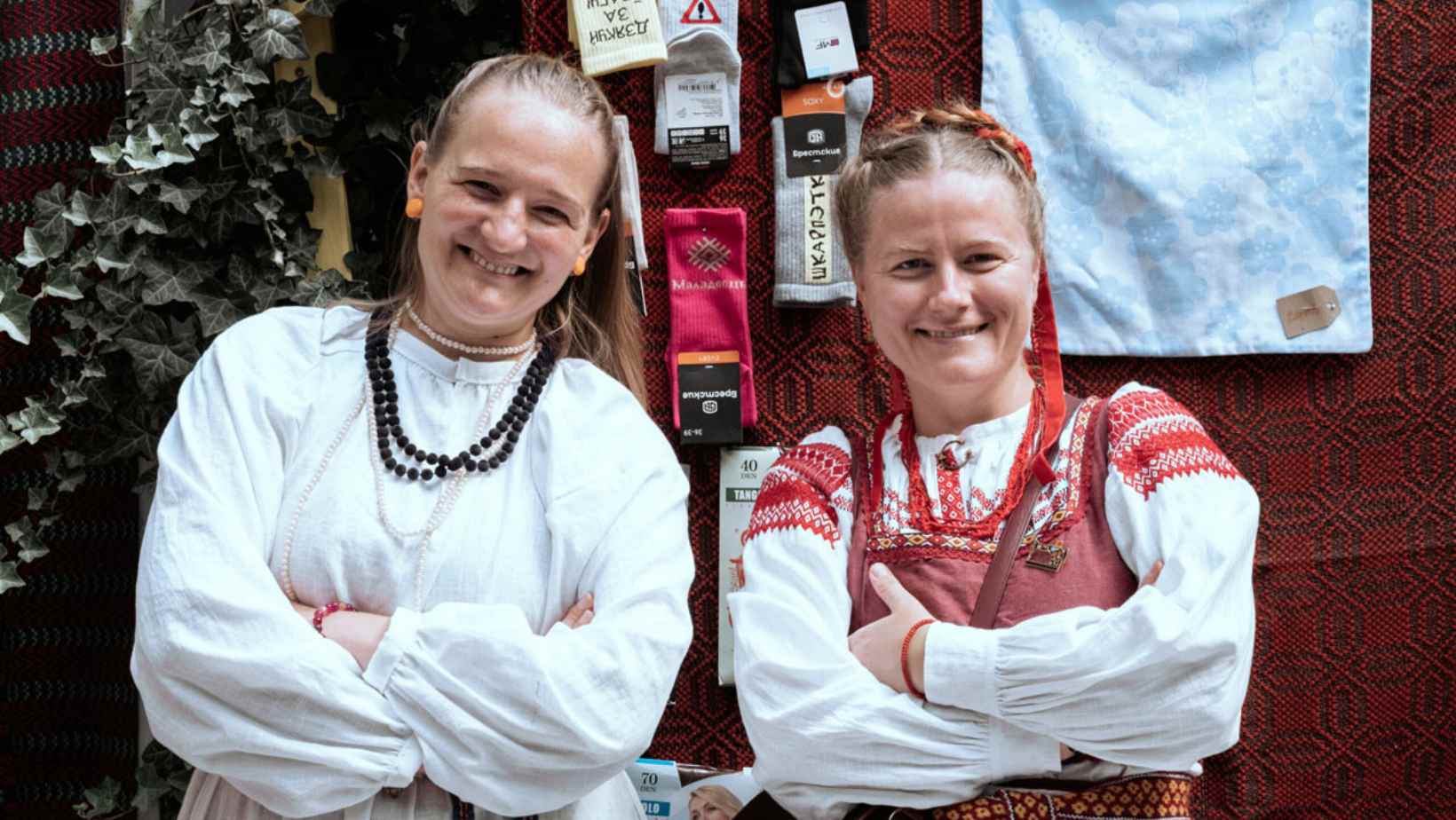
Would you like us to write about your business? Find out more
Public transport users in Prague and Central Bohemia should prepare for a substantial fare increase starting January 2026.
The regional governments are moving forward with a plan to raise prices by as much as 30% for paper tickets and 20% for digital fares, citing escalating operational costs and a push towards more efficient, electronic systems.
The Central Bohemian Regional Council has already approved the fare hike, with a final vote by regional councillors set for June 9. Prague City Council is expected to follow suit soon after.
According to Petr Borecký (STAN), regional councillor for transport, and Andrej Hofman, deputy director of the Integrated Transport System of the Central Bohemian Region (IDSK), preparations are underway to implement the changes by the beginning of next year.
What Will the New Fares Look Like?
Under the proposed changes:
- A regular 30-minute paper ticket covering three tariff zones will rise from CZK 30 to CZK 39.
- The same fare purchased via the PID Lítačka mobile app will cost CZK 36.
The goal is to encourage the use of electronic tickets, which reduce printing costs and speed up boarding.
Some commuters may not feel the full impact of the increase, as Prague zones are being streamlined, which could offset higher fares for certain routes. Additionally, new group discounts will be introduced—for example, for two adults and up to four children.
Automatic Inflation Adjustments Ahead
To avoid unpredictable price jumps in the future, the region also plans to introduce automatic fare indexing tied to inflation, similar to adjustments used in the national railway system. If approved, this would allow for fare changes approximately every two years, said Hofman.
He also noted that riders using individual tickets via the PID Lítačka app will soon be allowed to board buses through rear doors, eliminating the need to check in with the driver.
How Much Will This Cost—and Raise?
The Central Bohemian Region is expected to spend CZK 5.2 billion on transport services this year, marking a 13% increase from last year. However, fare revenues only cover around 29% of these costs. Ticket sales are expected to bring in CZK 2.7 billion, while the planned fare hike could add an additional CZK 375 million annually.
Overall transport costs—including regional expenses, state subsidies, municipal contributions, and ticket revenue—exceed CZK 9 billion.
Would you like us to write about your business? Find out more
From June 6 to 8, the area outside Cross Club in Prague’s Holešovice will host the eighth edition of the Cider Festival, bringing together producers and fans of craft cider from across Czechia and abroad.
This year’s event features more than 100 types of cider and lemonades, ranging from well-known Czech brands to small, independent makers.
Regular visitors can look forward to returning favourites like Opre Cider from Slovakia, a multiple audience award-winner.
Producers from Poland and Croatia, where cider culture is growing rapidly, will also be featured.
The festival isn’t just about drinks. Alongside the tastings, there will be live music, DJ sets, food stalls, and even a gin tasting session led by Landcraft Distillery.
Street food options will include Mexican dishes, sweets from Buchty z Brna, and selections curated by chef Filip Gunar. Visitors can also make use of the Cross Club café and garden, which will remain open into the evening.
The event runs daily from 12:00 to 22:00, and ticket holders will also get free access to Cross Club’s indoor events throughout the weekend.
Tickets are now available in advance for 150 CZK, or 200 CZK at the door. Admission includes a festival glass, which visitors can take home.
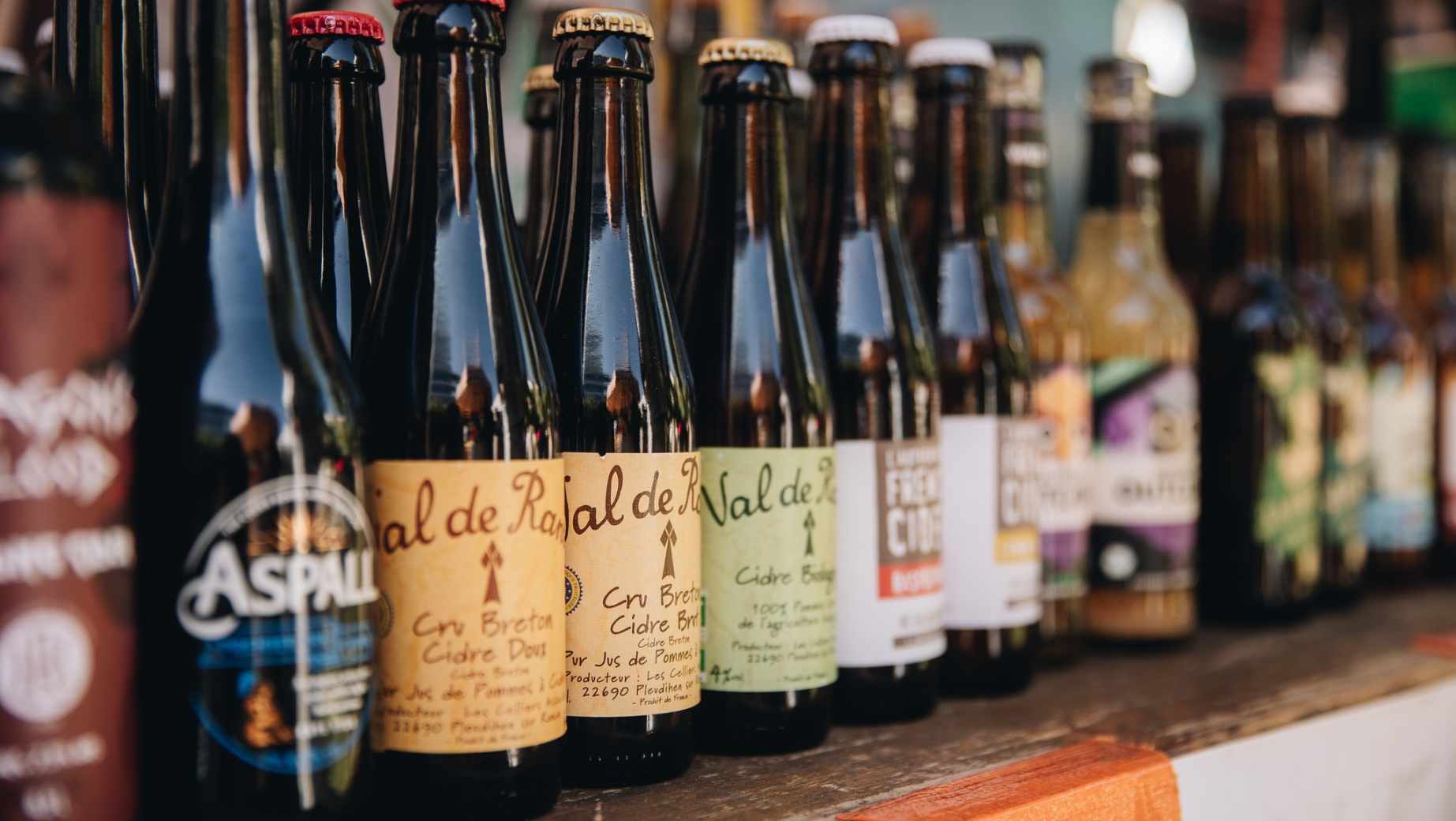
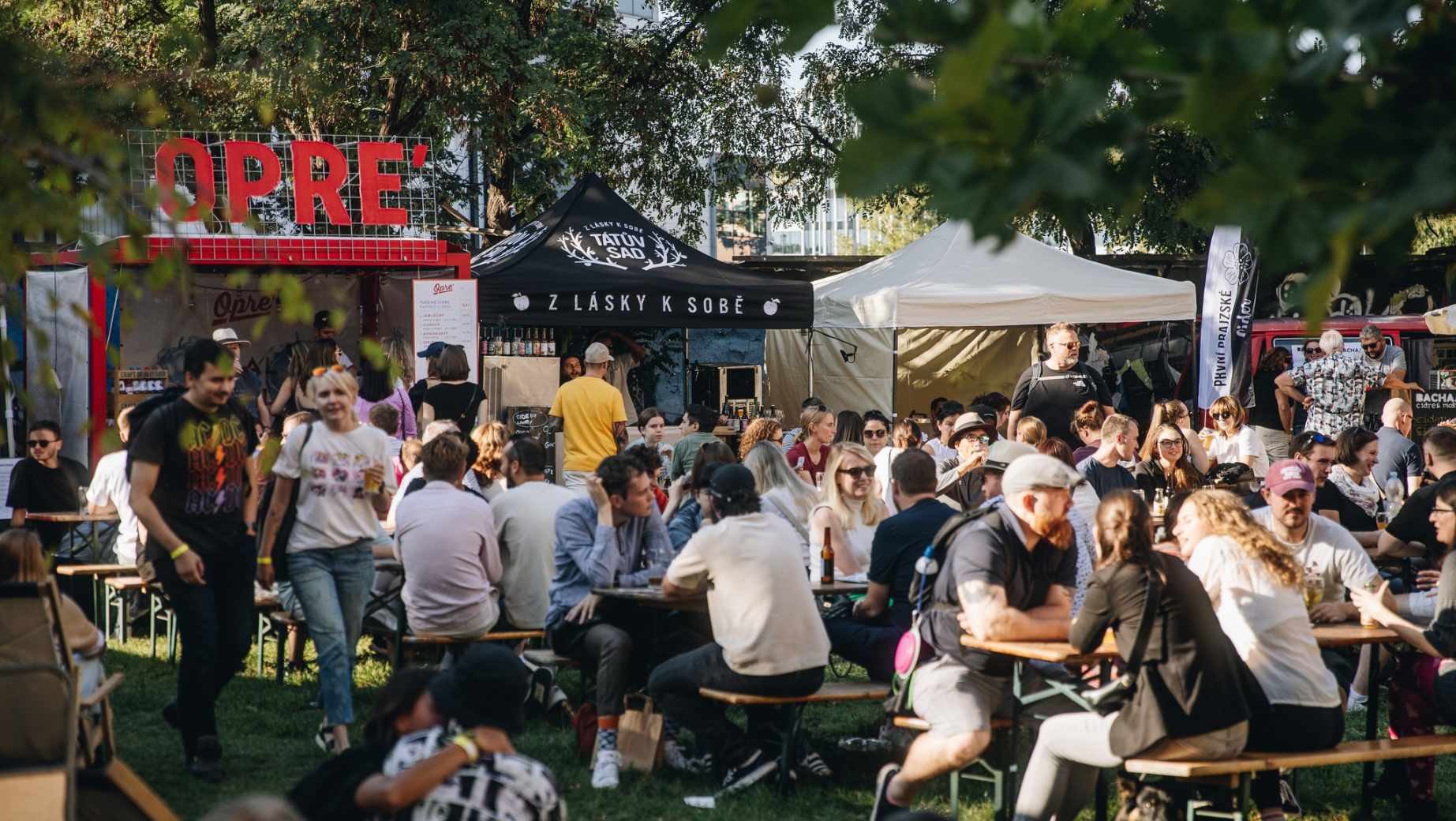
Would you like us to write about your business? Find out more
June in Prague is all about beer, music, and open-air fun. With dozens of microbreweries, street food, concerts, and family-friendly activities, the Czech capital will again celebrate its deep brewing tradition in style.
Here’s a guide to the best beer festivals taking place in Prague this month:
25 Years of Pivovar Strahov – June 6
Pivovar Strahov is turning 25, and it’s opening its doors to beer lovers for a day of special brews and a relaxed celebration. Attendees can enjoy unique beers like a Barrel-aged Baltic Porter matured in whisky and coffee barrels, and Spruce Spire, a fresh lager infused with spruce tips, brewed specifically for the occasion.
Žižkov Beer Festival – June 6 & 7
Parukářka Hill welcomes back the Žižkov Beer Festival, hosting dozens of brewers from across the country. Expect everything from classic lagers to bold experimental brews, accompanied by a full program of live music, street food, and family entertainment. A quirky highlight is the Žižkov Beer Coaster Turning Championship, taking place on Saturday, June 7. The festival is free to enter and will be hosted by Vojta Efler.
Sour Beer Festival – June 11 to 15, Permanent Pragovka
From June 11 to 15, the Sour Beer Festival returns for its fifth edition, bringing a wild lineup of colorful, tangy brews to Permanent Pragovka in Prague 9. Visitors can expect a carefully curated selection of Sour Ale, Berliner Weisse, Gose, Pastry Sour, Lambik, and other wild-fermented styles—many of them never before seen in the Czech Republic.
Prague Castle Microbrewery Festival – June 13 & 14
One of the most prestigious beer events in the Czech Republic returns to the Royal Garden of Prague Castle. The 13th edition of the Microbrewery Festival will feature 50 Czech and Moravian craft brewers, plus three standout Belgian breweries. Visitors can meet brewers in person, enjoy an intimate atmosphere (limited to 1,200 people daily), and take part in unlimited tastings. Tickets cost 750 CZK at the entrance and include a branded tasting glass, brewery catalog, and free-flow sampling throughout the event.
Desítka na desítce – June 14, Malešický Park
From 2 PM to 10 PM, Malešický Park transforms into a buzzing celebration of beer, world cuisine, and live music. Now in its third year, the festival features a strong lineup including Django Always, Frankie & The Deadbeats, MYDY, and the iconic Plastic People of the Universe. For families, the festival offers face painting, balloon art, workshops, and a bubble show for kids. Entry is free.
Beer at Náplavka – June 20 & 21
The event showcases small and microbreweries from all over Czechia. This year features new entries like Pivovar Bohdaneč, Bročan from Jince, and the Ruxusní microbrewery from Telč. Entry is free, but tastings require the purchase of a 0.3L glass mug, available on-site for 150 CZK. The fee includes a mug, tasting card, and pencil. The same mug can be used on both days.
Would you like us to write about your business? Find out more
After a cool and rainy spring, the Czech Republic is heading into a week of summer-like temperatures—but don’t leave your umbrella at home.
According to the Czech Hydrometeorological Institute (ČHMÚ), the next few days will bring a mix of sun, heat, and powerful storms as frontal systems sweep across Central Europe.
Monday will be cloudy to overcast. Most regions will see showers or occasional rain, with intense thunderstorms possible, especially in the southeast and east of the country.
Nighttime lows will range from 13°C to 17°C, while daytime highs will stay between 20°C and 25°C—though areas in the southeast may hit 27°C. Winds will come from the west to southwest, generally light to moderate, increasing briefly during storms.
On Tuesday, expect continued cloudiness and light showers, particularly in the east. Night temperatures will dip slightly, ranging from 12°C to 16°C, and possibly down to 9°C in the west and northwest. Daytime temperatures should remain stable at 20°C to 25°C.
By Wednesday, warmer air returns. Most of the country will enjoy temperatures from 23°C to 28°C, although the western regions will be slightly cooler at 20°C to 23°C. Skies will start out partly clear, but clouds and afternoon thunderstorms will likely develop from the west. Overnight temperatures will stay mild, between 11°C and 15°C.
Thursday’s forecast brings another dip in temperature, with highs between 18°C and 26°C, and up to 28°C in the west. Most of the country will see cloudy skies, as a new wave of showers and storms rolls in from the west. The southwest to west wind will continue at 2 to 6 meters per second, occasionally stronger during storms.
Cloudy Weekend with Scattered Showers
Looking ahead to the weekend, skies across the Czech Republic are expected to remain mostly cloudy, with intermittent rain and isolated thunderstorms.
Night temperatures will fall between 11°C and 16°C, cooling further to around 7°C to 12°C by Sunday night. Daytime highs will hold at 22°C to 27°C on Saturday, but may drop to 18°C to 23°C as the weekend progresses.
